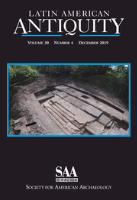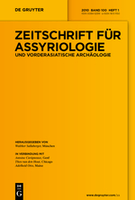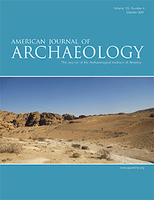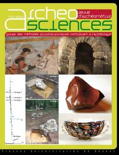
LATIN AMERICAN ANTIQUITY
metrics 2024
Illuminating the Past: A Gateway to Latin America's Ancient Civilizations
Introduction
LATIN AMERICAN ANTIQUITY is a prestigious journal published by Cambridge University Press, focusing on the archaeology and history of Latin America. With an impressive impact factor reflecting its critical role in the academic community, this journal exemplifies excellence in research, landing in Q1 across multiple categories, including Archaeology and History, as per the 2023 category quartiles. The journal's scope covers a broad range of topics related to pre-Columbian cultures, ancient civilizations, and historical developments, making it essential reading for researchers, professionals, and students keen on exploring the rich tapestry of Latin American heritage. Although it is not an open-access publication, LATIN AMERICAN ANTIQUITY remains a vital resource for those dedicated to advancing knowledge in this dynamic field. With its commitment to scholarly rigor and a strong ranking in Scopus, it serves as a cornerstone for academic dialogue and investigation.
Metrics 2024
 0.60
0.60 1.10
1.10 1.30
1.30 46
46Metrics History
Rank 2024
Scopus
IF (Web Of Science)
JCI (Web Of Science)
Quartile History
Similar Journals

Zeitschrift fur Assyriologie und Vorderasiatische Archaologie
Advancing Knowledge of Ancient CivilizationsZeitschrift für Assyriologie und Vorderasiatische Archäologie, published by WALTER DE GRUYTER GMBH, is a distinguished journal in the field of archaeology, focusing on the rich histories of the ancient Near East and Assyrian studies. Established in 1886, this journal has a venerable tradition of contributing to scholarly discourse, continuously curating impactful research that positions it within the Q2 quartile in the domains of Archaeology and Arts and Humanities as of 2023. With an impressive ranking of #101 out of 413 in Arts and Humanities and #98 out of 354 in Social Sciences within Scopus, the journal serves as a vital resource for researchers, professionals, and students alike. Although it operates under a subscription model, the journal's extensive coverage—from its inception to the present day—ensures a comprehensive exploration of archaeological methodologies, discoveries, and theoretical frameworks. The journal's aim is to advance the understanding of the ancient civilizations of the Near East and to foster scholarly communication across international platforms, making it an essential venue for contemporary archaeological research.

Boletin del Museo Chileno de Arte Precolombino
Bridging Disciplines to Unravel Pre-Columbian MysteriesBoletin del Museo Chileno de Arte Precolombino is a premier multidisciplinary journal published by the MUSEO CHILENO ARTE PRECOLOMBINO in Chile, dedicated to exploring the rich tapestry of pre-Columbian art and culture. With both ISSN 0716-1530 and E-ISSN 0718-6894, this Open Access journal has been providing free and immediate access to its scholarly content since 2016, making it a vital resource for researchers, professionals, and students alike. Covering diverse areas within anthropology, archaeology, and the visual arts, the journal consistently ranks in the Q1 category across multiple disciplines, illustrating its significance in fostering academic community dialogue and advances in understanding ancient cultures. As it converges from 2014 to 2024, the journal is poised to further enhance its impact, maintaining an esteemed position within Scopus rankings and reinforcing its commitment to high-quality research and scholarship in the humanities.

Journal of Ancient History and Archaeology
Discovering the Rich Tapestry of HistoryJournal of Ancient History and Archaeology is a premier, open-access academic journal published by MEGA PUBLISHING HOUSE since 2014, dedicated to exploring the rich tapestry of ancient civilizations and archaeological discoveries. With ISSN 2360-266X, this journal has made significant strides in the field, achieving elevated rankings across multiple categories, including Q1 in Classics and Q2 in History as of 2023. Positioned in Romania, the journal serves an international audience of researchers, professionals, and students who seek to disseminate and access influential scholarship in ancient history and archaeology. As a prominent resource within the Scopus rankings, it reflects a robust commitment to advancing knowledge through quality research, making it a vital platform for the sharing and discussion of innovative ideas and methodologies. The journal covers a wide array of topics related to ancient societies, enhancing our understanding of their cultural, historical, and archaeological significance.

AMERICAN JOURNAL OF ARCHAEOLOGY
Decoding the Past for Tomorrow's ScholarsThe American Journal of Archaeology (ISSN: 0002-9114, E-ISSN: 1939-828X), published by the esteemed University of Chicago Press, stands as a leading scholarly journal in the field of archaeology, celebrated for its rigorous peer-reviewed research. With an impressive impact factor that places it in the Q1 quartile for both archaeology and archaeology within the arts and humanities, this journal ranks among the top 15% in its field, according to Scopus metrics. It serves a global audience of researchers, professionals, and students, facilitating the dissemination of innovative findings from excavations, historical analyses, and methodological advancements. While primarily available through subscription, the journal's archives and features provide invaluable resources for deepening one's understanding of the past and engaging with current archaeological discourse. Operating from its home in Chicago, USA, the American Journal of Archaeology actively contributes to the advancement of knowledge and scholarship in archaeology, making it an essential platform for those invested in the exploration of ancient civilizations and cultural heritage.

ARCHAEOLOGY
Bridging the Gap Between Past and PresentARCHAEOLOGY is a distinguished peer-reviewed journal published by the Archaeological Institute of America, focusing on the multifaceted aspects of archaeological research and its relevance to contemporary society. Established in 1966, this journal serves as a critical platform for scholarly discourse in the field, showcasing innovative findings, theoretical advancements, and methodological discussions related to archaeology. While it maintains a Q4 ranking within the disciplines of archaeology and arts and humanities, its contributions remain valuable for those engaging in archaeological studies or seeking to understand historical and cultural narratives. The journal is accessible in print, with an ISSN of 0003-8113 and an E-ISSN of 1943-5746, ensuring that a wide audience can benefit from its insights. Although currently not classified as Open Access, the meticulous peer-review process ensures a high standard of academic rigor, making it an essential source for researchers, professionals, and students alike who are dedicated to exploring the past through archaeological lenses.

Ancient Asia-Journal of the Society of South Asian Archaeology
Unearthing the Rich Tapestry of South Asian HeritageAncient Asia - Journal of the Society of South Asian Archaeology, published by ARF India, stands as a pivotal resource for the exploration and dissemination of archaeological research focused on the rich history and culture of South Asia. Since its inception as an Open Access journal in 2006, it has become an essential platform for scholars and enthusiasts alike, boasting an impressive range of quartile rankings across multiple disciplines, including Anthropology, Archaeology, History, and Visual Arts. With expansion into various indexed categories and consistent dissemination of impactful research common to this highly diverse field, Ancient Asia aims to foster interdisciplinary dialogue, facilitate collaboration among researchers, and enhance the global understanding of ancient civilizations within the region. By embracing an inclusive access model, the journal encourages wide readership and engagement, positioning itself as a key player for students, professionals, and academics interested in delving into the archaeological marvels of South Asia.

ArcheoSciences-Revue d Archeometrie
Advancing Knowledge at the Intersection of Science and HistoryArcheoSciences-Revue d Archeometrie is a prominent scholarly journal dedicated to the field of archaeology, published by PRESSES UNIV RENNES in France. With an ISSN of 1960-1360 and an E-ISSN of 2104-3728, this journal has gained recognition for its focus on the intersection of science and archaeological research, aiming to foster interdisciplinary dialogue and innovative methodologies within archaeological studies. Although coverage of the journal has been discontinued in Scopus post-2021, it has maintained a respectable standing with a Q3 Quartile ranking in both the Archaeology (Arts and Humanities) and Archaeology categories as of 2023, as well as commendable Scopus rankings in relevant fields. As an accessible platform for researchers, professionals, and students, ArcheoSciences offers valuable insights into applied techniques and findings in archaeological science, making it an essential resource for those involved in the historical and cultural analysis of material relics. Researchers are encouraged to explore this journal to stay informed about frontier research and ongoing discussions in the discipline.

Ancient Civilizations from Scythia to Siberia
Fostering Discourse on the Foundations of CivilizationAncient Civilizations from Scythia to Siberia, published by BRILL, is a pivotal journal dedicated to the exploration and scholarly analysis of ancient cultures in Eurasia, with a focus spanning from the Scythian tribes to the Siberian territories. With an ISSN of 0929-077X and an E-ISSN of 1570-0577, this journal plays a significant role in the fields of Archeology, Classics, and History, holding esteemed rankings in Q3 and Q1 categories, thus affirming its status in the academic community. Covering a wide temporal range from 1995 to 2024, the journal aims to provide a comprehensive platform for researchers and students to disseminate their findings and foster collaborative discourse. With impact rankings in the 86th and 75th percentiles for Classics and History, respectively, it is recognized for its high-quality contributions that advance knowledge in these areas. Although currently not an open-access journal, it offers various options for accessing its rich content. By bridging gaps in historical understanding and engaging with the complexities of ancient societies, Ancient Civilizations from Scythia to Siberia remains an essential resource for those passionate about uncovering the narratives of our past.

Cartagine-Studi e Ricerche
Bridging disciplines to enrich the study of the past.Cartagine-Studi e Ricerche is a distinguished academic journal published by UNIV STUDI CAGLIARI, dedicated to advancing the fields of Archaeology, Classics, and History. With an Open Access format since its inception in 2016, this journal ensures that scholarly research is freely available to a global audience, fostering knowledge dissemination and collaboration among researchers, professionals, and students. Based in Italy, it occupies a vital place in the academic community, holding a Q3 ranking in each of its categories for 2023, showcasing its relevance and impact in the disciplines it covers. Scopus rankings further validate its quality, with impressive percentiles reflecting its significant contributions to the landscape of arts and humanities. Spanning converged years from 2019 to 2024, Cartagine-Studi e Ricerche serves as a crucial resource for those engaged in the study of ancient cultures and historical contexts, inviting innovative research and critical discussions that shape our understanding of the past.

Spal
Bridging Time: Where Archaeology Meets History.Spal is a distinguished academic journal dedicated to the fields of Archaeology and History, published by the University of Seville, Editorial. With an ISSN of 1133-4525 and an E-ISSN of 2255-3924, it has established a prominent reputation within the scholarly community, currently enjoying an impressive Q1 ranking in Archeology (Arts and Humanities) and History, alongside a Q2 ranking in Archeology for 2023. The journal serves as a critical platform for researchers, professionals, and students alike, promoting the dissemination of cutting-edge research and innovative methodologies in these vital disciplines. Spal's Scopus Ranks place it in the 84th percentile for Arts and Humanities - History and the 72nd for Archeology within the field, emphasizing its impact and relevance in contemporary scholarship. Although it operates under a traditional access model, its commitment to advancing knowledge and discourse in archaeological and historical studies remains unwavering. The journal's coverage spans from 2015 to 2024, positioning it well to contribute to ongoing academic conversations and foster collaborations within the global research community.